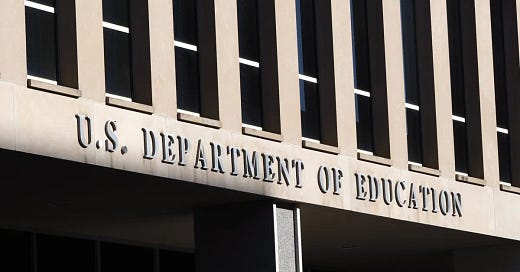Five Things to Know in Education: Education Department withholds $6.2B from schools
Howdy Y'all,
Welcome to EdNews! 🎉 Our team at Student Success Agency strives to curate meaningful industry trends and market insights every week on the world of education. Join us to facilitate a meaningful conversation on the future of education and its role in shaping the next generation of leaders.
5 THINGS TO KNOW
Start your week off with the biggest headlines in education:
💰 ‘Immediate harm’: Education Department withholds $6.2B from schools
School districts across the U.S. are facing major disruptions, including canceled after-school programs, English learner services, and professional development, due to the U.S. Department of Education withholding $6.2 billion in federal K-12 grant funds that were expected to be available on July 1. The affected programs include Title II-A, Title III-A, Title IV-A, Title IV-B, and Title I-C, which together support services like migrant education, after-school care, academic enrichment, and teacher training. Education advocates warn the delay will cause immediate harm, particularly in under-resourced districts, forcing layoffs, contract cancellations, and halted services. Leaders stress these programs are vital for millions of students, not optional, with some warning of increased risks like academic failure, absenteeism, and child hunger. The Education Department has not clarified how long the funding review will take, leaving states and districts in limbo, while advocates and lawmakers push for urgent action, warning that further delays will cause lasting damage. (K-12 Dive)
📚 Large Public Libraries Give Young Adults Across U.S. Access to Banned Books
Across the U.S., young adults are increasingly struggling to access books that reflect their identities and experiences due to widespread book bans, restrictive laws, and underfunded libraries—especially in conservative and rural areas. In response, urban libraries like Brooklyn Public Library launched Books Unbanned, a digital program granting free access to their full collections for youth nationwide. Since 2022, over 8,000 teens and young adults have used the program to borrow hundreds of thousands of titles, many unrelated to banned subjects. While similar programs have launched in cities like Seattle and Boston, access often depends on private funding and licensing agreements. However, systemic censorship—through laws, self-censorship, and restrictive digital lending policies—continues to threaten access, privacy, and First Amendment rights. Teachers and librarians report a chilling effect, with many avoiding controversial materials to avoid backlash. With federal budget proposals threatening services like InterLibrary Loan, many fear that only a few urban libraries may be left to serve the nation’s most vulnerable readers. Advocates emphasize that while Books Unbanned provides vital support, it is a temporary fix in a growing national crisis over equitable access to information. (EdSurge)
🏫 Trump Signs ‘Big, Beautiful Bill’ Into Law, Ushering in New Era for Higher Ed
President Trump signed the One Big Beautiful Bill Act into law on July 4, following a narrow House vote and a dramatic legislative push. The sweeping tax-and-spending package includes nearly $1 trillion in Medicaid cuts and tax breaks for the wealthy but also enacts major changes to higher education, such as capping student loans, eliminating Grad PLUS loans, and tying college eligibility for federal aid to graduates' earnings. While some college leaders were relieved that proposed cuts to Pell Grants and extreme endowment taxes were removed, many remain deeply concerned about the bill’s impact on low-income and minority students, university finances, and college access. Supporters praised provisions like expanding Pell Grants to short-term job programs and an earnings-based accountability system, though critics argue the changes could worsen student debt and restrict educational opportunities, particularly for vulnerable populations. The legislation is expected to add $3.3 trillion to the national debt over the next decade, and higher education leaders warn of severe long-term consequences, urging Congress to protect student-focused programs in future budget negotiations. (Inside Higher Ed)
🤖 Over 60 organizations sign White House pledge to invest in AI education
The “Pledge to America’s Youth: Investing in AI Education” highlights the Trump administration’s push for public-private partnerships to advance AI in K-12 education, with companies like Google, IBM, Meta, Microsoft, and others committing to detailed plans for responsibly integrating AI tools in schools. The Software & Information Industry Association (SIIA) announced it would develop best practices for transparent AI use in classrooms. U.S. Education Secretary Linda McMahon praised the initiative’s momentum, emphasizing its potential benefits for teachers and students. Meanwhile, the Senate removed a proposed moratorium on state AI regulations from a broader bill, which narrowly passed with Vice President JD Vance’s tie-breaking vote. The House version still includes a 10-year AI moratorium, prompting opposition from education groups like AASA, which argue it would eliminate state protections and prioritize tech companies over student safety. The final bill must now be reconciled between the House and Senate before going to President Trump for approval. (K-12 Dive)
📝 When do 2025 AP scores come out? Where to get results
Advanced Placement (AP) exam scores for 2025 will be released starting Monday, July 7, with the exact time varying by location, according to the College Board. AP exams, which assess students’ mastery of college-level coursework, are scored on a scale of 1 to 5 and can help students earn college credit by allowing them to skip certain courses. Students will receive email notifications once their scores are ready, and they can access their results online through their My AP account on the College Board website. (USA TODAY)




